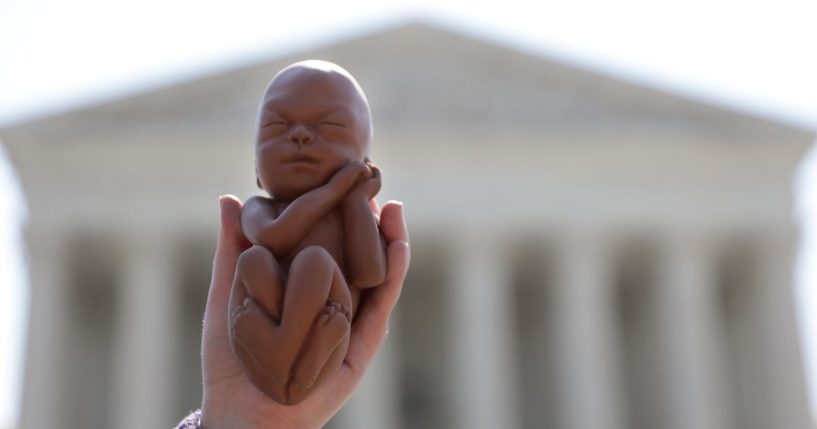
There's a Fatal Flaw Hiding in Roe v. Wade
Responding to the Supreme Court’s refusal to block the Texas heartbeat law SB 8, President Joe Biden, propped up by Vice President Kamala Harris and riding high on his “outstanding success” in Afghanistan, has issued his own pre-emptive judgment.
“This extreme Texas law blatantly violates the constitutional right established under Roe v. Wade and upheld as precedent for nearly half a century,” he said in a statement.
Over 50 hasty executive orders in a mere seven months, and now Joe Biden is handing down Supreme Court judgments?
There is no so-called “right” to kill innocents to be found in the Constitution. It was never a legitimate precedent.
Faulty Precedent Facilitated Roe’s Infamous Bungle
Roe was an error of judgment slickly glossed over, a faulty precedent cited ad nauseam until, almost 50 years on, some 62 million unborn Americans have been “lawfully” killed in their mothers’ wombs.
Circuit Judge James Ho, in a recent abortion case and en banc opinion, decried the injustice that occurs when erroneous precedents override the Constitution:
“Nothing in the text or original understanding of the Constitution establishes a right to an abortion. Rather, what distinguishes abortion from other matters of health care policy in America — and uniquely removes abortion policy from the democratic process established by our Founders — is Supreme Court precedent.”
Ho identified the error of confining “our attention not to what the Constitution says, but to what the Supreme Court has held.”
Fatal Flaw in Judicial Reasoning
Roe’s author, Justice Harry Blackmun, claimed that abortion before “viability” is not a criminal offense because the fetus is not capable of sustaining life.
But that contradicts the definitive meaning of abortion in the compendium of legal terminology “Black’s Law Dictionary.”
It is because “the delivery or expulsion of the human fetus takes place prematurely before it is capable of sustaining life” that “causing or procuring abortion” is defined as a criminal offense in criminal law.
Blackmun took the substance of the crime and turned it into a justification for legalizing that very crime. In Roe, he changed the actual basis of the crime into a pseudo-reason for decriminalizing it.
Right to Life: An ‘Unalienable’ Gift ‘Endowed by the Creator’
From the beginning, abortion was recognized as a crime. At the time of drafting the Constitution, James Wilson was the best American authority on the legal status of “an infant … able to stir in the womb.”
A signatory to both the Declaration of Independence and the Constitution, Wilson was one of George Washington’s original appointees to the first U.S. Supreme Court.
His “Of the Natural Rights of Individuals” provides the clearest evidence we have of the original underlying intention to include “the infant … in the womb” in the legal protections promised in the Constitution:
“Human life, from its commencement to its close, is protected by the common law. In the contemplation of law, life begins when the infant is first able to stir in the womb. By the law, life is protected not only from immediate destruction, but from every degree of actual violence, and, in some cases, from every degree of danger.”
In abortion jurisprudence operating at the time the Constitution was enacted, causing or procuring an abortion was a crime prohibited precisely because of the pre-viability of the unborn child.
It was precisely because the child could not survive outside the mother’s womb that the causing or procuring of an abortion was recognized in law as criminal and thus was prohibited.
Blackmun could not have made such a grievous error if, before writing Roe, he had made a less perfunctory attempt to examine the Founders’ original common-law understanding of the right to life of an “infant en ventre sa mere” or in the mother’s womb, as taught by Sir William Blackstone, the foremost authority in the Founders’ time.
He would have discovered that the right to life is recognized as an “unalienable” gift of God — “endowed by the Creator.” It is the very first of the “unalienable” rights listed in the American Declaration of Independence.
All federal and state laws are required to uphold this principle that innocent human beings cannot be lawfully deprived of the substance of their rights, not in any circumstances, not even at their own or their mothers’ request.
No person, no state, no legislature and no judiciary — not even the U.S. Supreme Court — may destroy the right to life of any human being, nor deprive them of that right, nor transfer that right, nor renounce it: That’s what “unalienable” means.
None may remove the right to life of the unborn child from the protection mandated by the rule of law recognized by the Constitution.
False Claim That Abortion Was ‘Never Established as a Common-law Crime’
Yet Blackmun cobbled together in Roe a misleading version of common law history on abortion in order to make it “now appear doubtful that abortion was ever firmly established as a common law crime even with respect to the destruction of a quick fetus.”
Blackmun wrongly claimed that restrictive criminal abortion laws are of relatively recent vintage, that they are not of common law origin.
There was no credible basis for such a claim.
Infants’ Rights ‘Equally Respected at Every Period of Gestation’
In the very decade the 14th Amendment was drafted, Francis Wharton set out a true account of the infant’s legal status in “A Treatise on the Criminal Law of the United States“:
“It has been said that it is not an indictable offence to administer a drug to a woman, and thereby procure an abortion, unless the mother is quick with child, though such a distinction … is neither in accordance with the result of medical experience, nor with the principles of the common law. The civil rights of an infant in ventre sa mere are equally respected at every period of gestation.”
Wharton’s American Law tome also exposes Blackmun’s faulty scholarship in Roe [138-9] on the significance of quickening:
“The notion that a man is not accountable for destroying the child before it quickens, arose from the hypothesis that quickening was the commencement of vitality with it, before which it could not be considered as existing. This ‘absurd distinction,’ … is now exploded in medicine, the fact being considered indisputable, that ‘quickening’ is the incident, not the inception of vitality.”
“The foetus is certainly, if we speak physiologically, as much a living being immediately after conception as at any other time before delivery; and its future progress is but the development and increase of those constituent principles which it then received.”
Abortion Is Unconstitutional
The Supreme Court in 1973 had no authority to remove a foundation stone from the common-law basis of the whole American constitutional legal system.
Our smallest human beings targeted for abortion are alive and flourishing while living inside the mother’s womb, where all live human beings are meant to be in the first nine months of life. Their natural human right to live there was recognized in the common law upon which the Constitution was founded.
In criminal law, that was always the offense — that the fetus being expelled was too premature to live.
But Roe v. Wade turned this on its head and claimed falsely that because the fetus being expelled was too premature to live, then no offense is committed.
Amending the values of the Constitution was never the Supreme Court’s work.
The views expressed in this opinion article are those of their author and are not necessarily either shared or endorsed by the owners of this website. If you are interested in contributing an Op-Ed to The Western Journal, you can learn about our submission guidelines and process here.
Truth and Accuracy
We are committed to truth and accuracy in all of our journalism. Read our editorial standards.
Advertise with The Western Journal and reach millions of highly engaged readers, while supporting our work. Advertise Today.












